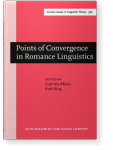Chapter 15
Exceptionality and ungrammaticality in Spanish stress
A Stratal OT approach
Regular Spanish stress is stem-final, but many exceptions exist. Though exceptions must be accounted for, they must not yield ungrammaticality. The current proposal distinguishes exceptionality from ungrammaticality by arguing for some degree of quantity sensitivity in Spanish stress assignment. Past approaches that do not take syllable weight into account predict that a nonce input, like rapind-o, if marked as exceptional, will bear ungrammatical, antepenultimate stress (*rápindo). This proposal resolves this by analyzing Spanish stress using Stratal OT, where Regular stress is stem-final. Lexically-indexed constraints allow for each of the exceptional stress patterns, without yielding ungrammatical forms. An exceptional nonce input like rapind-o appropriately receives penultimate stress (rapíndo) regardless of if it is marked as exceptional, thus not conflating exceptionality with ungrammaticality.
Article outline
- 1.Introduction
- 2.Data
- 3.Current proposal
- 3.1Stratal OT
- 3.2Accounting for the Regular pattern
- 3.3Exceptional stress
- 3.3.1Class 3 exceptions as Class 1 exceptions
- 3.3.2Exceptional words longer than three syllables
- 4.Exceptionality distinguished from ungramaticality
- 5.Remaining words
- 6.General discussion and conclusions
-
Acknowledgements
-
Notes
-
References
References (22)
References
Baković, Eric. 2016. Exceptionality in Spanish stress. Catalan Journal of Linguistics 15. 9–25. 

Bermúdez-Otero, Ricardo. 2008. Stratal Optimality Theory. Oxford: Oxford University Press.
Doner, Julianne. 2017. Spanish stress and lexical accent across syntactic categories. Probus 29(2). 233–285. 

Dunlap, Elaine R. 1992. Issues in the moraic structure of Spanish. Amherst MA: University of Massachusetts Amherst dissertation.
Eisner, Jason. 1997. What constraints should OT allow. Paper presented at the 71st Annual Meeting of the Linguistic Society of America, Chicago, IL, January 2–5. Available as ROA-204 from the Rutgers Optimality Archive. Handout.
Gordon, Matthew. 2002. A factorial typology of quantity-insensitive stress. Natural Language & Linguistic Theory 20(3). 491–552. 

Harris, James W. 1982. Syllable structure and stress in Spanish. A nonlinear analysis. Cambridge, MA: MIT Press.
Harris, James W. 1985. Spanish diphthongisation and stress: A paradox resolved. Phonology 2(1). 31–45. 

Hualde, José I. & Marianna Nadeu. 2014. Rhetorical stress in Spanish. In Harry van der Hulst (ed.), Word stress: Theoretical and typological issues, 228–252. Cambridge: Cambridge University Press. 

Jarosz, Gaja. 2018. Indexed morphemes and locality conditions of Polish yer deletion. Paper presented at the 26th Manchester Phonology Meeting, Manchester, UK, May 24–26.
Kiparsky, Paul. 2000. Opacity and cyclicity. The Linguistic Review 17(2–4). 351–366. 

Lipski, John M. 1997. Spanish word stress: The interaction of moras and minimality. In Fernando Martínez-Gil & Alfonso Morales-Front (eds.), Issues in the phonology and morphology of the major Iberian languages, 559–593. Washington, DC: Georgetown University Press.
Martínez-Paricio, Violeta. 2013. The intricate connection between diphthongs and stress in Spanish. Nordlyd 40(1). 166–195. 

McCarthy, John J. 2000. The prosody of phase in Rotuman. Natural Language & Linguistic Theory 18(1). 147–197. 

McCarthy, John J. 2003. OT constraints are categorical. Phonology 20(1). 75–138. 

McCarthy, John J. & Alan S. Prince. 1990. Foot and word in prosodic morphology: The Arabic broken plural. Natural Language & Linguistic Theory 8(2). 209–283. 

Pater, Joe. 2000. Non-uniformity in English secondary stress: The role of ranked and lexically specific constraints. Phonology 17(2). 237–274. 

Pater, Joe. 2009. Morpheme-specific phonology: Constraint indexation and inconsistency resolution. In Steve Parker (ed.), Phonological argumentation: Essays on evidence and motivation, 123–154. Sheffield, UK, Equinox.
Prince, Alan & Paul Smolensky. 1993/2004. Optimality Theory: Constraint interaction in Generative Grammar. Malden, MA: Wiley-Blackwell.
Roca, Iggy. 1988. Theoretical implications of Spanish word stress. Linguistic Inquiry 19(3). 393–423.
Waltermire, Mark. 2004. The effect of syllable weight on the determination of spoken stress in Spanish. In Timothy Face (ed.), Laboratory Approaches to Spanish Phonology, 171–191. New York: Mouten de Gruyter.
Cited by (1)
Cited by one other publication
Torres-Tamarit, Francesc & Violeta Martínez-Paricio
2024.
The prosody of Spanish acronyms.
Natural Language & Linguistic Theory 42:2
► pp. 815 ff.

This list is based on CrossRef data as of 4 july 2024. Please note that it may not be complete. Sources presented here have been supplied by the respective publishers.
Any errors therein should be reported to them.
